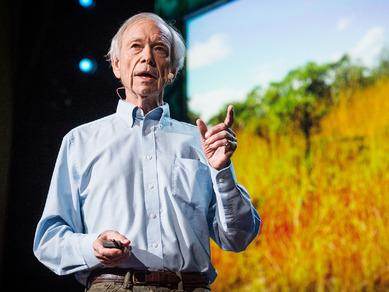posted 12 years ago
Adrien I will be going off your site now. Thank you for inviting me – I must say I had no idea how much time it would take over 3 days but feel every minute was worth it. I sincerely hope I have been able to create at least an awareness that greatly improved cropping polyculture practices alone will not reverse the desertification taking place over billions of hectares of the world’s land. Land so vast and where humidity distribution is not adequate to maintain ecological processes using high levels of manpower, fossil fuels and money to plant tap-rooted species (trees, shrubs, forbs) as the main agents of stability and production. I also hope I have helped dispel the widespread beliefs that managing holistically is some sort of grazing system. An understandable confusion because so many people have developed plagiarized derivatives of our work. Thanks to all who asked questions, and for your kind feedback.
Long ago I wrote that I could see only two things that might now save humanity – an issue large enough to unite us as a species, and the means for ordinary citizens to openly communicate rapidly around the globe (free of censorship by authorities, experts and governments). Climate change is now with us despite remaining denials largely due to multi billion dollar corporate smokescreens. And the means for us to communicate globally we are now using as I write.
Agriculture is not crop production. It is the production of food and fibre from the world’s land and waters. And, as currently carried out with our reductionist management, agriculture is without any doubt mankind’s most destructive endeavor ever, having destroyed more civilizations than armies and now a greater global threat even than fossil fuels. As I pointed out in the TED talk even in a post-fossil-fuel world of benign mass energy climate change will continue because of agriculture if we do not change.
Agriculture always involves managing “complexity”- social, cultural, environmental and economic. In a world in which nature and complexity function in wholes and patterns as Smuts wrote in 1926, management needs to be holistic and cannot successfully be reductionist. And management needs to be based on sound science and scientific principles few could argue. What constitutes reductionist management? I would define it as management in which the context for any objective is need, desire or addressing a problem. All objectives require a context and such contexts are too simplistic for the complexity of the real world – hence agriculture now contributing to global desertification, poverty, social breakdown, abuse of women and children, cultural genocide of ancient proud pastoral people, violence, war and climate change. It was this same reductionist management that led to past civilizations failing as their societies proved incapable of managing the complexity of rising population and agricultural environmental damage, before fossil fuels, monocultures and industrial agriculture. Managing holistically I would define as management at any level in which objectives have a holistic context. This is a new concept, not previously in any branch of science, philosophy or in any religion, that ties people’s deepest values and culture to their life-supporting environment.
The role of permies, as you call yourselves, is vital if we are to address our flawed agriculture and I admire the level of global networking you have achieved amongst wonderful caring open-minded people helping one another with ideas and experiences applying sound principles to crop and small animal production mainly. I hope that I have been able to at least create and awareness of the need for the holistic framework in all management – from household and small farm to government and international policies and development projects.
We at Savory Institute are striving to get the holistic framework into international consciousness rapidly to avert tragedy beyond imagination. The road over the past fifty years has been rocky indeed because as John Ralston Saul, studying our major global blunders since Voltaire and the age of reason, wrote “The reality is that the division of knowledge into feudal fiefdoms of expertise has made general understanding and coordinated action not simply impossible but despised and distrusted.”
The leadership the world desperately needs is not ever going to come from universities, experts, governments, major NGO’s or international agencies. It can only come from ordinary people like you and me. With this in mind our institute is embarking on a strategy of having people around the world form learning hubs that we will connect to one another with through an internet platform. All such hubs to be locally led and managed and to involve some land base. In late June in Boulder people from the first ten countries will meet to begin helping one another form such learning hubs. I sincerely hope that permies world-wide will begin understanding the need for management to be holistic and join in such collaboration. Only through massive collaboration between organizations and people of all cultures have we any hope of jointly beginning to revers desertification and develop an agriculture that does produce more food than eroding soil to sustain civilization as we know it. I hope many of you will join us creating this vast practical network of people learning with one another, and at least get our regular news through our website.
Please all of you feel free to use anything I wrote and distribute as widely as you like in any manner you can. We need to get greater understanding to billions of people because our survival depends on a more informed citizenry in all nations and the commonsense of ordinary people.
Warmest regards
Allan

 2
2









 1
1
















 1
1
















 4
4






















